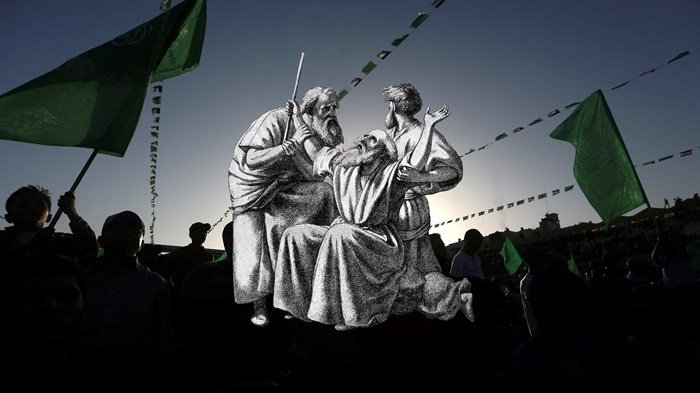
When Benjamin Netanyahu announced the launch of ground operations in Gaza on October 28, weeks after Hamas terrorists murdered 1,200 civilians and abducted 240 hostages on October 7, he summoned the memory of an ancient foe.
“Remember what Amalek did to you,” the Israeli prime minister stated. “We remember and we fight.”
It was a reference his audience would understand.
In the Exodus narrative, the Amalekites attack the Hebrew people in the wilderness and are defeated in a dramatic conflict where Moses raises his arms over the battlefield. Later, in Deuteronomy 25:17–19, Moses exhorts the Israelites to “remember what the Amalekites did to you” and, after they have come into possession of the Promised Land, to “blot out the name of Amalek under heaven.” Finally, in 1 Samuel 15, God ordered King Saul to “totally destroy” the Amalekites, including women, children, and infants. Saul defeats the enemy, but is condemned for sparing their king and cattle.
Rabbinic commentary came to identify Amalek as a kind of paradigm for any enemy of the Jews that seeks their total destruction. Netanyahu had previously hinted the “new Amalek” could be a nuclear-armed Iran, and one of his advisors explained the word is used as a stand-in for “existential threat.” It has been invoked in reference to the Romans, the Nazis, and the Soviets.
Christians made the biblical comparison with Hamas even before Netanyahu, however, prompting discussion of responsible biblical interpretation in the midst of war.
Shortly after October 7, the International Christian Embassy Jerusalem (ICEJ) said the Hamas attack was “rooted in the demonic realm as a manifestation of the Spirit of Amalek.” The ICEJ invited Christians around the world to “ascend to our spiritual vantage point and join in this battle, just as Moses prayed while Joshua was fighting Amalek on the ground.”
Some Messianic Jewish leaders have agreed.
“In every generation the hatred of Amalek rises up in an attempt to annihilate the Israelites,” said Ariel Rudolph, director of operations for Jerusalem Seminary, citing Exodus 17:16. “Once one understands the spirit of hatred for God’s chosen, that originates from Satan, one understands that evil of hatred must be eradicated.”
Rudolph criticized Christians who call for mercy on Hamas and the salvation of terrorists as failing to recognize the biblical principle to eliminate any threat that would wipe out the people of Israel.
Other Messianic Jewish leaders are more conflicted.
“On the one hand, something must be done to prevent Hamas from repeating anything like what happened on October 7,” said Ray Pritz, a retired pastor of a Messianic Jewish congregation between Tel Aviv and Jerusalem. “But on the other hand, the great loss of life in Gaza is sad beyond words.”
With a PhD in early Jewish Christianity from Hebrew University, Pritz clearly critiqued Hamas’s equation with Amalek. “Anyone making the connection must rely heavily on interpretation,” he said. “With a preconception and a concordance, it is possible to prove almost anything you want from the Bible.”
The text does not say that Amalek sought to “wipe out” Israel, he said. But even if this is assumed, the conditions of the Book of Exodus are not applicable today. By “God’s promise or otherwise,” the people are in the land. And despite Hamas’s intentions, Pritz said, there is “no likelihood” that the Jewish nation—much less the Jewish people as a whole—will be eliminated.
Noam Hendren, however, said the Bible presents Amalek as an “archetypal enemy,” representing all who seek the destruction of God’s people.
Leader of a Messianic Jewish congregation in north central Israel, Hendren has a ThM in Old Testament and Semitics from Dallas Theological Seminary. The “from generation to generation” language of Exodus 17, he said, implies a continuing threat even though the Amalekites have disappeared. He connects God’s oath to destroy Amalek with the Genesis 12:3 promise to “curse those who curse” Israel, which applies to all who oppose God’s plan for world redemption through the Jews.
It cannot be applied, he said, to the residents of Gaza collectively.
“The genocidal atrocities committed by Hamas certainly qualify them to be considered Amalek in its reincarnation,” said Hendren. “But any attempt to identify an entire people group with Amalek—such as Palestinians—is false.”
A few have tried.
In 1980, rabbi Israel Hess wrote an article entitled “Genocide: A Commandment of the Torah,” using Amalek as an example of Palestinian displacement. Hess was dismissed from his position at Bar Ilan University as a result.
In 1994, extremist Baruch Goldstein massacred 29 Muslims praying in Hebron, believing they represented the Deuteronomic enemy. The government of Israel condemned the movement he represented as terrorists and banned them from government; however, Goldstein became a kind of folk hero in some far-right circles, especially among the settler movement.
One admirer, Itamar Ben-Gvir, has become Israel’s minister of national security.
According to Jill Jacobs, head of T’ruah, a rabbinical human rights organization, the “overwhelming history” of Jewish interpretation sees Amalek as metaphorical, with the most common application being the encouragement to eliminate evil within oneself.
“The biblical text has been employed to justify wars for far too long, and no one should tolerate such use anymore,” agreed Myrto Theocharous. “Any interpretation that encourages self-examination and repentance would be preferred.”
Theocharous, professor of Hebrew and Old Testament at the Athens-based Greek Bible College in Athens, recalls hearing the metaphorical interpretation of Amalek at a synagogue last year during Purim, when Jews traditionally read the Deuteronomy passage.
The holiday, described in the Old Testament Book of Esther, commemorates when the Jews in Persia faced an existential threat at the hands of Haman, described as an “Agagite,” presumably a descendent of the last Amalekite king. But the biblical queen’s courage reversed the heart of the king, and with his authorization, the Jews killed over 75,000 people who had plotted to kill them (Esther 9:16).
Hormoz Shariat, founder of Iran Alive Ministries, called it clear self-defense.
Noting that God is not mentioned in the Book of Esther, he said that God was at work behind the scenes. Israel had a spiritual calling to produce the Messiah, and Satan—then as now—has a “supernatural and demonic” hatred against the Jews.
“Whenever there is a big mission,” Shariat said, “there is an escalated level of spiritual warfare.” And whether against Amalek, Haman, or modern Arab nation-states, he said, God has protected Israel.
Hendren cited Psalm 83, where the Amalekites are listed with the Edomites, Ishmaelites, Philistines, and others plotting against God’s people to “destroy them as a nation, so that Israel’s name is remembered no more.”
The proper response, Hendren said, is the “absolute necessity” of alignment with God and his people. To spiritualize the conflict between Israel and Amalek—into an allegory of the believer’s struggle against sin, or the church’s struggle against evil in society—effectively does what Amalek intended: denying Israel the fulfillment of God’s promises.
“Israel’s role in God’s plan,” he said, “did not end with the birth of the Messiah.”

Support Our Work
Subscribe to CT for less than $4.25/month









